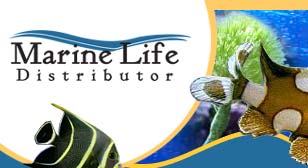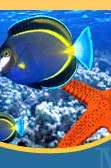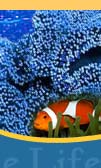





Terms, Conditions, and Info (Quick Links)
PRICING
ORDERS
CATALOG
SHIPMENTS
DEALER PRICES
DEAD ON ARRIVALS (doa)
FLORIDA MARINE FISH DEALERS MUST READOnline orders are not available at this time.
Terms, Conditions, and Info
PRICING (back to top)
NO C.O.D. shipments, we accept company Checks, Visa, MasterCard, Discover, American Express, and Bank Transfer!
All goods will be paid for in advance of shipping. This can be done with either a bank transfer into our Bank Account or by sending companies check a minimum of 6 days prior to shipping day or by one of the above credit cards. All prices are subject to change without notice. Currency is in United States of America Dollars. F.O.B. Orlando Airport. Prices and sizes are subject to change without prior notice. Orders subject to availability at time of packing.ORDERS (back to top)
Orders may be placed 7 days per week on the internet. Additions to your order can be made up to 2 days prior to your order shipping day. We may call you anytime, or you get a fax or email from us on our specials. You may also direct fax or email us orders to us 24 hours a day and log on to our web site and place your order, 7 days a week, or complete an on-line order Form for your order to be processed automatically with our sales staff they may call you back with any questions. Minimum Order is $500.00, Orders OVER $1,000 FREE box charges.CATALOG (back to top)
We are an importer/wholesaler and not open to the public.
Our catalog is on the internet with quantity and prices, but you will need a user name and Password to get access.SHIPMENTS (back to top)
Marine Life Distributor staff keeps track on your all movements of your shipment to insure its safe arrival to you. We will fax or email you in advance, giving you the airline and airway bill number or tracking number from UPS or FedEx to help you trace your shipment. We do our best to choose reliable airlines, which handle tropical fish properly. Once we turn the shipment over to the courier, it is out of our control due to weather and other situations.Our staff will call prior to shipment, should your order not fill an entire box thus maximizing your airfreight charge.
Note: All marine fish species are packed individually. Quantity per box may also differ slightly due to the duration of flights and their respective flight schedules. SHIPPING only WITHIN THE U.S.A.( except for Hawaii and Alaska)
NEXT DAY DELIVERY available.DEALER PRICES (back to top)
Retail Businesses: Our Product price list is password protected. Please download our application and sign it and fax it to us and also fax a copy of your business license (county and/or city), your resale certificate, State Sales Tax Certificate, and in Florida you Florida Wild Life Retail Certificate to 1-407-330-3240. We will then e-mail you your user name and password.DEAD ON ARRIVALS (doa) (back to top)
If any DOA'S should occur, please inform us within 24 hours of receiving the shipment with sufficient details of the species, quantity and cause if known. Replacements will be made should the reason lie with us. First 10% ($ of product value) DOA to be absorb by customer. Anything above 10% should be reported within 24 hours along with photo image records, send it by email to service@marinelifedist.com. Upon approval, we will furnish Replacement Credit on your next order. Replacement Credit is applied only to products i.e. fish, corals, inverts, etc. Freight, other cost & fees can not be credited and have to be paid in full. Any DOA caused by delayed flight or negligence and/or mishandling by carrier should be directed to the carrier, file a claim directly to carrier at time of pick-up. Replacement Credit is subject to approval. Marine Life Distributor reserves the right to refuse any DOA claims for any reasons. Average DOA Rate on Product based on experience is less than 10%.FLORIDA MARINE FISH DEALERS MUST READ (back to top)
MEMORANDUM August 9, 2002
TO: Pet Shop Owners, Wildlife Dealers and Other Interested Persons
FROM: Colonel Julie Jones Director, Division of Law Enforcement
SUBJECT: Pet Shop and Wildlife Dealer Fact SheetThe Florida Fish and Wildlife Conservation Commission (FWC) is committed to responsible ownership of captive wildlife in Florida. It is the FWC’s desire to work with and assist the public in any way possible to provide for the lawful and humane possession and sale of wildlife. If we may be of any assistance, please call any FWC Office.
Outlined below are some of the rules and regulations regarding the possession and/or sale of wildlife in Florida. This information is designed to serve solely as a reference and does not include all rules in the Wildlife Code. FWC regulations govern the importation, possession, sale, exhibition, and transportation of all wildlife and fish in Florida, whether indigenous or not. This fact sheet is designed to assist you with your operations, as well as respond to customer inquiries. If there is any information needed that is not covered here, you may direct those inquiries to the FWC Regional Office in your area, you may access our website at www.floridaconservation.org for a complete listing of the Captive Wildlife Regulations, or contact our Headquarters Inspections Section Office at (850)488-6253.
General Information
Every person, firm, or corporation that sells or exhibits wildlife in Florida must be licensed for the Exhibition or Sale of Wildlife. The cost of this license varies based upon the number of specimens of wildlife: for 10 or fewer specimens the cost of the license is $5 per year, for 11 or more the cost is $25. This license is not required for the sale of poultry, hamsters, guinea pigs, domestic rats and mice, gerbils or Anolis lizards.
Permittees must keep records of acquisition, which includes the source and supplier, for the wildlife in their possession. It is illegal to buy, sell, or transfer any wildlife to or from any unpermitted entity within Florida. Those individuals selling or transferring wildlife must maintain records of said sale or transfer. The recipient’s transferor’s name, address, and permit or license number (if required) shall be entered in the records.
Pet Shop and Wildlife Dealer Fact Sheet
August 9, 2002Page Two (back to top)
These records must be kept for one year after the transfer. The “donation” of an animal is permissible if there is no exchange of money or trade involving other items of value; however, the source of acquisition record and record of transfer must be maintained by the receiver and transferor of the wildlife, respectively.
The FWC classifies wildlife according to the danger they present to the owner and the general public. There are three categories or “classes” of wildlife. Examples of Class I wildlife include great apes and other large primates, large cats (lions, tigers, leopards, jaguars), elephants, rhinos, hippos, crocodiles, and bears. These animals are not typically seen in the pet trade and may not be possessed as a personal pet in Florida. Class I wildlife may only be possessed for exhibition or sale, and requires a minimum of one year (to consist of not less than 1,000 hours) of substantial practical experience to qualify for a license. Class II wildlife present a lesser danger to their owners and the general public, and as such may be possessed as personal pets. Again, applicants must demonstrate a substantial amount practical experience. They must demonstrate either one year of experience, or successfully complete a written examination and demonstrate 100 hours of experience. Examples of Class II wildlife include medium-sized cats (cougars, bobcats, lynx, servals), medium- sized primates (macaques, guenons, howler monkeys), wolves, coyotes, caiman, badgers, and ostriches. Certain types of Class I and II wildlife may only be kept on areas that are at least five acres or 21/2 acres, respectively. A complete list of Class I and Class II wildlife may be found in 68A-6.002, Florida Administrative Code. Class III wildlife are those animals which are not listed as Class I or II. Excluding the few exceptions listed below, a license or permit is required for the possession of Class III wildlife. Examples of Class III wildlife include raccoons, non-native fox, skunks, lemurs, marmosets, and deer. In Class III there are three primates for which the Class II experience requirements apply in order to qualify for the permit. These are the capuchin, spider, and woolly monkeys. Purchasers of Class III wildlife must have a valid permit or license prior to acquiring the animal.
Those Class III animals which may be possessed for personal use without a permit are: non-protected and non-venomous reptiles and amphibians, gerbils, hedgehogs, honey possums, sugar gliders, brush-tailed possums, shell parakeets, rats and mice, canaries, moles, shrews, rabbits, squirrels, chipmunks, ferrets (domestic; European), love birds, guinea pigs, cockatiels, hamsters, parrots, finches, myna birds, toucans, doves (ringed, ruddy, and diamond), button quail, prairie dogs, and chinchillas.
In addition to the license or permit requirements, individuals possessing wildlife must meet standard caging requirements. Any condition which results in wildlife escaping from its enclosure, leash, cage or other constraint, or results in injury to any person is a threat to public safety, and a violation of the Wildlife Code. The standard caging requirements include the minimum standards for housing all wildlife in order to ensure that basic physical and psychological needs of the animal are met. These requirements are found in 68A-6.004, F.A.C., and may be obtained at any FWC office or from our website. Wildlife held for sale by licensed individuals may be housed in smaller cages or enclosures for a period not to exceed 60 days. Along with caging requirements, there are standards for sanitation, nutrition, waste disposal, cleaning and maintenance of the enclosures contained in the captive wildlife regulations. Itemized below are specific regulations for various types of fish and wildlife.
Pet Shop and Wildlife Dealer Fact Sheet
August 9, 2002Page Three (back to top)
Tropical Fish, Frogs and Aquatic Plants
To sell freshwater tropical fish, you must have a Freshwater Fish Dealer’s License. The cost of a resident license is $40 per year. If you sell saltwater fish, you must obtain a Retail Saltwater Products License, the cost is $25 per year for a resident license. Applications for these licenses are available at any FWC Office. If you sell aquatic plants, you must obtain a license from the Department of Environmental Protection. There is no charge for this license; however, it is a criminal offense to sell aquatic plants without it. There are two categories of highly regulated aquatic species in Florida. Examples of these species include freshwater stingrays, black arowana, piranha, electric eels, and tilapia. A complete listing of these species is found in 68A-23.008, F.A.C. “Restricted” species may only be possessed with a special permit and sold only to individuals with a special permit for that species. “Prohibited” species may only be possessed for public viewing at large, public aquaria or for research purposes (no permits are issued for piranha). In addition, there are saltwater species which are prohibited and may not be possessed in Florida. These include the weeverfishes, stonefishes, and sea snakes. It is illegal to release any non-native aquatic species into any waters of the state.
Reptiles
If you are selling or exhibiting reptiles, you must be licensed to possess wildlife for exhibition or public sale. The possession of venomous reptiles requires a separate license. The cost of the venomous reptile license is $5 per year. Applicants must meet a one year experience requirement in order to qualify for a license. Permittees must also meet safe housing requirements. Permits are not required for the personal possession of non-venomous, non-protected reptiles, such as snakes and lizards.
Non-native reptiles may be exhibited or sold with proper license authorization, provided they were lawfully acquired. Several native reptile species may not be sold, or offered for sale in Florida. These are alligator snapping turtles, box turtles (all four subspecies), Barbour’s Map turtles, Escambia River Map turtles, diamondback terrapins, river cooters, loggerhead musk turtles, gopher tortoises, indigo snakes and Florida pine snakes (except albino specimens). Turtles with a carapace length of less than four inches may only be sold for scientific, educational, or exhibition purposes. This is a U.S. Department of Public Health regulation.
All crocodilian species, except American alligators, are listed as Class I or II wildlife which may only be possessed by licensed individuals. Permittees must meet all experience and standard caging requirements. Captive bred American alligators may be sold within Florida to a person licensed for the Exhibition or Sale of Wildlife. Alligators may not be possessed in Florida for personal use. Prior to the import of leopard or African spurred tortoises into Florida from other states, a permit from this agency is required.
Pet Shop and Wildlife Dealer Fact Sheet
August 9, 2002Page Four (back to top)
Birds
A license to possess Wildlife for Exhibition or Sale is required for anyone displaying, selling, or breeding exotic birds for the purpose of sale. This does not apply to domestic fowl, such as chickens and pigeons. Individuals who sell or transfer any live non-native bird to another must maintain bird sale or transfer records for a period of 24 months following the sale or transfer. These records include the name and complete address of the recipient, date of sale or transfer, and number and species of birds sold.
A Game Farm License is required for the propagation of game birds (quail, pheasants, geese, ducks, etc.). The cost of this license is $5 per year. In addition, there are regulations governing the sale of game birds for food or hunting purposes. Individuals raising non-domestic waterfowl must also obtain a permit from the United States Fish and Wildlife Service. All migratory birds are protected under state and federal laws and may not be possessed, bought, or sold without proper authorization.
Escape or Release of Non-native Wildlife
Because of Florida’s semi-tropical climate and suitable water, the state is very vulnerable to the colonization of exotic species. Most any species that is native to South America, Africa, or Asia can survive in the wilds of Florida. Because of the many exotic aquatic and land plants already established, many times a non-native species has a very easy time adapting. Florida has approximately 100 species of exotics (including fish, birds, mammals, reptiles and amphibians) established and further “homesteading” of non-native wildlife presents a real threat to our resources. Some parrots and other exotic birds compete with our native birds for food and nesting space. Many exotic fish can prey on or provide keen competition to native bass and bream. Exotic mammals, such as monkeys, eat native birds/eggs and are a disease hazard to humans. Some exotics if established, such as venomous reptiles or large lizards, could present a hazard to human safety, as well as fish and wildlife.
This is called “biological pollution” and Florida Statute 372.265 makes it a crime to purposefully release any non-native species into the wild. FWC regulations also state it is illegal to “negligently” allow the escape of captive wildlife, or non-native fish. Please encourage exotic pet owners to ensure their charges are securely caged at all times. Violations should be reported through the FWC’s toll-free Wildlife Alert numbers listed in your local telephone book. Continued escape or establishment of exotics in Florida could result in additional restrictions on the importation, sale, and possession of non-native wildlife. This could be necessary to protect Florida’s native ecosystems, which are very sensitive and vulnerable to change.
KH\LEH\su
J:/InspStd Memo/JJPetshop & WL Deal FS
FWC 1-3-4
cc: Lt. Colonel Jim McCallister
Bureau Chiefs